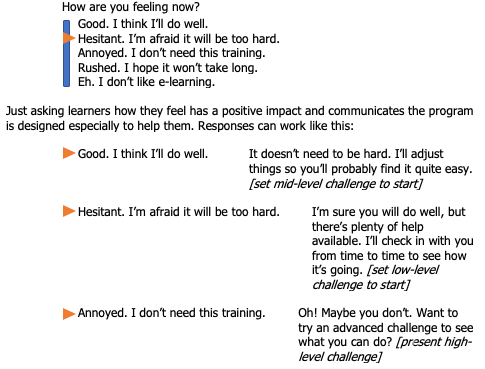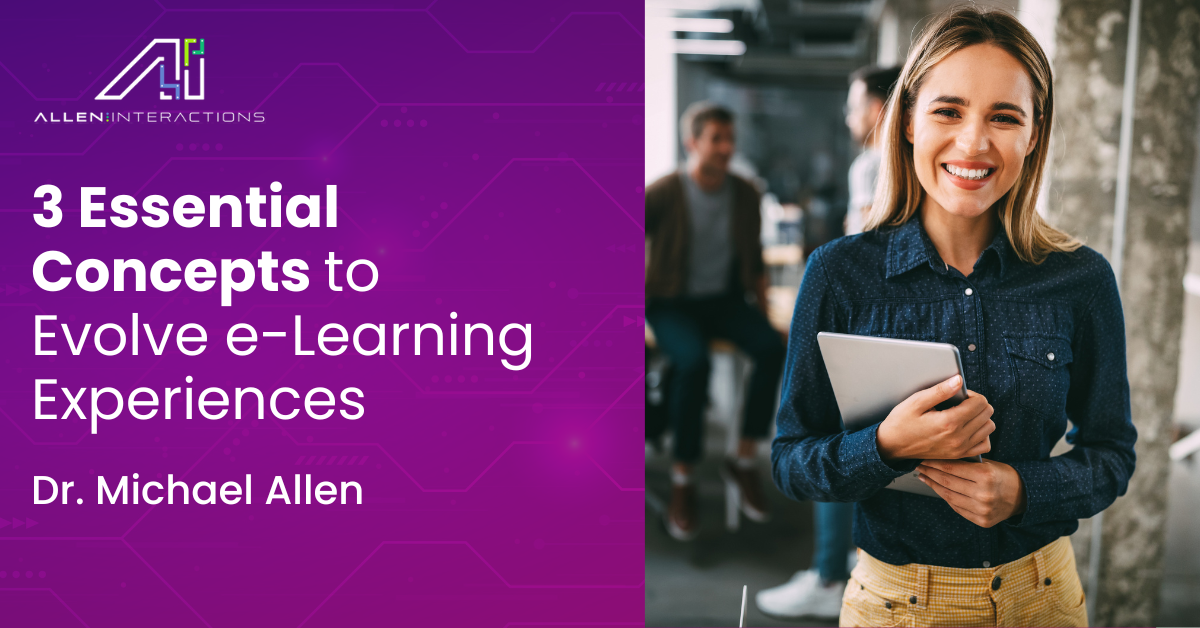Even with well over 50 years of researching and developing e-learning, I continue to make discoveries that seem to have been staring me in the face for decades. Hidden in plain sight. These discoveries remind me that e-learning remains an opportunity largely unrealized and full of potential.
There’s never been a time when that potential is more desperately needed, given new work and study locations, rapidly changing job requirements and workforce shortages. Both training and education are being forced to adapt. It seems that’s a good thing as change is coming too slowly from within. We have only to hope it’s a beneficial change we’re being pushed into.
At this point in its evolution, three essential concepts stand out as primary drivers toward the kind of e-learning experiences everyone wants, students, trainees, educators, trainers, and employers. Together they characterize what everyone needs for e-learning that maximizes the benefit of every moment of instruction. But it’s Essential Concept 3 that it’s the latest discovery for me. And it’s a powerful one.
Essential Concept 1 — Individualization
While it’s true we are so much alike, we are also individuals—people with different life experiences, preferences, competencies, fears, aspirations, and motivations. Can the same learning experiences benefit all persons equally? Of course not. Why would we ever think so? And yet, we tend to put everyone through the same learning programs.
The legacy of classroom-based instruction has shaped our thinking and taught us that’s what learning environments look like. But in a classroom, with all its pragmatics, it is difficult to individualize instruction much at all. We accept in a classroom that our instruction is going to benefit some people more than others. The classic grading system of A through F is an admission of inadequacy to address individual needs.
The original excitement about e-learning was not to see if we could replicate the classroom together with its strengths and weaknesses, but rather to see if we could individualize instruction so every learner could be given exactly the learning experience needed. The model to emulate was a personal mentor as opposed to a classroom instructor. Mentors continually assess performance and select or construct learning activities at the right level of challenge for learners as they progress. They try not to waste a minute of the learner’s time—not one ounce of energy and focus. Good e-learning does this as well. E-Learning presentations and quizzes do not. In my opinion, individualized instruction is the only type of e-learning worthy of anyone’s time and investment.
I should note there are many variables that comprise individualization, such as level of challenge, amount of hints and aids provided, spacing of practice, and so on. But with e-learning, these things are not difficult and more practical than seems to be recognized. More on this is below.
Essential Concept 2 — Relevance
“Today we are going to learn the 7 principles of elliptic curve cryptography.” Yippy. Why?
“I’ll show you later how to put it to application.” Oh. Now I’m excited. (Not.)
Since we can’t learn learners, and they must do the learning work themselves, learning motivation, focus, and engagement are essential. One of the most effective ways to ramp up learning motivation is to make content clearly relevant to the learner. This means presenting a context, right up front, that describes a situation learners can easily manage themselves in and a challenge they could be facing. This makes a great introduction and kickoff to any learning course and module.
In contrast to proclaiming the future value of learning the content at hand, context and challenge, when done well, do a better job: Imagine you are trying to persuade a prospect to buy a higher-priced product than she’s ordered before. Not only have both context and challenge been revealed instantly, but it’s clear to trainees they will learn how to handle such situations. To a salesperson, this could be extremely valuable and generate instant engagement.
.png?width=800&height=419&name=2023%20Blog%20Covers%20and%20In-Line%20Graphics%20(7).png)
Essential Concept 3 — Empathy
Huh? I know. Empathy. It’s unexpected. But in the many hundreds of projects our studios have produced for clients and projects created by others, I’m seeing those that recognize learner affective state are the most powerful. Just as a good mentor watches closely not only the developing skills of a learner and also how the learner is feeling and reacting, powerful e-learning does the same—assessing and adjusting as the experience progresses.
There are many affective states that influence learning, even determining the possibility of learning:
- I’ve never been good at math and never will be.
- I don’t need this course. I’ve figured out the best way to do my work and I’m not changing that.
- I’m not in sales. Why should I have to learn the details of our products?
- I should be teaching this course.
- I’m really afraid I’ll do poorly and be embarrassed.
- This is exactly the course I’ve been wanting, except I hate e-learning.
- Of course, there are positive affective states as well. But even they can be problematic if not addressed:
- I’m really good at this stuff and anxious to prove it.
- I love e-learning because I’m really good at taking tests. I skip to them ASAP. Done.
It may seem difficult or impractical to recognize affective states and respond to them. But neither is the case. Assessments can be as simple as periodically asking how the learner is feeling and also making it easy for the learner to speak up. For example:

Challenge levels can be modified in many ways, some of which are as simple as adjusting the amount of help provided or how explicit it is. Help might be provided in terms of hints for those expressing confidence, whereas a fully worked example might be provided on request from those worried they won’t do well.
Not Your Father’s e-Learning
They don’t make Oldsmobiles any longer (I miss them), and it’s time to abandon e-learning in the classroom legacy style of presenting information and testing retention. It was never an excellent instructional paradigm, and its use in e-learning only makes it worse. The superpower of e-learning is its ability to provide exactly the right learning experience for each learner precisely when it will provide the greatest benefit. The concepts to achieving the greatest performance improvement in the least time for all learners is through relevance, individualization, and empathy!
-1.png?width=75&height=75&name=Copy%20of%20It%20is%20not%20the%20strongest%20of%20the%20species%20that%20survive%2c%20nor%20the%20most%20intelligent%2c%20but%20the%20one%20most%20responsive%20to%20change%E2%80%99%20(11)-1.png)





Comment